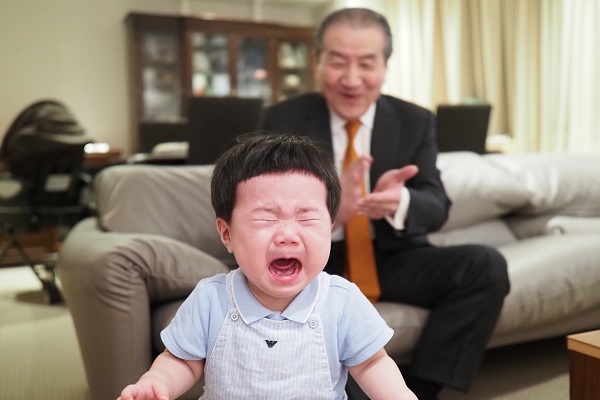Megahealth News
- 2020/10/26Vol.29 When baby cries
 9 months after birth, he was able to stand up by himself without holding onto something,
9 months after birth, he was able to stand up by himself without holding onto something,
but he did not know what to do and began to cry out.Now, a baby in front of you fell down on the house floor and suddenly began to cry! What will you do?
There is no correct answer to this question. Many may run up to the baby. As for myself, unless there is an apparent danger, first of all, I would observe the situation. And if he continues to cry, I speak to him slowly and cheerfully, “It’s alright, it’s alright” and “Don’t worry, mother is here.” And if I am close to him, I would lightly pat his back and cheer him up. And yet he grizzles or comes clinging and crying, then for the first time I would raise him or lift him in my arms. During these movements, I carefully tried to move slowly and composedly.
There are two reasons why I react as such.
The first is that when my son was a newborn baby, whenever he cried, I repeated the action of immediately fulfilling his wants. I reflected that this conduct of mine have directly linked to his behavior of conveying something to the parent = crying. Based on this situation, the advice the doctor gave me at the medical examination for one-month-old was that “Except for extraordinary situation, it is alright to watch over the baby to cry. When the baby really needs help, the baby will cry as such.” I was truly convinced by these words. Obviously, there are variety of baby-cries, and sometimes baby cries seriously with desperate look, and other times, baby squalls briefly and regains good mood. And there is a limp-cry just like mumbling. First of all distinguishing the level of urgency, and when the urgency level is low, I tried to show my attitude saying “I understand” close by the baby. I comprehended that as long as a parent is watching close by, the baby gradually begins to learn the method of self-control such as recovering good mood and solve the problem by own-self.
And the second reason is “not to exaggerate” pain and discomfort. This is also important in neuroscience, and at the time the baby is experiencing pain and discomfort, if a parent is upset and rushes up or shout with startle, though the baby’s pain is not so bad, the baby learns “Ah, it is very serious as mother is panicking so much, so the next time I fall down I must cry.” Of course, as a parent seeing the child fall down it is natural to feel startled. But unless the child is apparently injured, I would stay close and take care so the child would not think it serious and try to nestle close and make the child feel safe.
However, when there is visible injury or sickly change/condition, try not to startle the child and swiftly connect to the medical institution. And as for the invisible alarming change, such as high fever, apparently not eating, and there is some case of not crying out when hitting the head. Let us take action by assisting the child’s self-control and development, and also forecasting the emergency.
